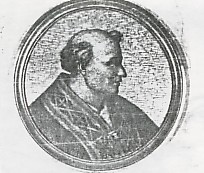 Few have been more
reluctant to accept the papacy than the monk who became Victor III. Dauferius
was born of the noble family of the princes of Benevento. Though his family
planned a marriage for him, Dauferius was determined to be a monk.
Few have been more
reluctant to accept the papacy than the monk who became Victor III. Dauferius
was born of the noble family of the princes of Benevento. Though his family
planned a marriage for him, Dauferius was determined to be a monk.
When his father died fighting the Normans, Dauferius escaped the watch of his
relatives and entered a monastery. But the enraged relatives hunted him down,
tore off his religious habit and hustled the would-be monk home. Dauferius,
however, had a mind of his own, and soon escaped again. This time his relatives
agreed to let him remain a monk. As a Benedictine monk, he received the name
Desiderius. In spite of his aversion to honor and power, his sweet disposition
and pronounced ability caught the attention of the reforming Popes. St. Leo IX
and Victor II took a great liking to the young Benedictine, and Stephen X made
him abbot of Monte Cassino. Desiderius proved to be one of the greatest in the
long line of Cassinese abbots. Desiderius found the old abbey in a ruinous state
and energetically undertook a wide-scale rebuilding program. Under his
leadership there rose a chapter house, an abbots' house, a library, a dormitory,
and a great church. From far-off Constantinople he procured artists in mosaic
and marble to beautify his church.
Pope Alexander II consecrated it in 1071. No mere bricks-and-mortar abbot,
Desiderius took great pains to help his monks advance in the spiritual life. Nor
was he neglectful of the abbey's intellectual life. He was zealous to secure
manuscripts for his library, among them works of Cicero, Ovid, and Virgil. As
abbot of Monte Cassino, Desiderius was a great personage in Southern Italy. This
power he used loyally to back the reform popes. Nicholas II made him a cardinal
and papal legate. He had great influence with the Normans, and it was he who
secured their help for St. Gregory VII in his time of need. It is not surprising
that when Gregory VII died, Abbot Desiderius was sought as his successor. But
Desiderius simply would not agree to accept the heavy honor. At last on
Pentecost Sunday, May 24, 1086, the exasperated Cardinals and clergy carried
Desiderius to the Church of St. Lucy, and forcibly clothing him with the papal
mantle, called him Victor III. But four days later Victor put off the papal
insignia and withdrew to Monte Cassino. It was almost a year before he finally
consented to serve as pope. At a great council held at Capua in 1087 Victor at
last surrendered. When the Normans drove antipope Guibert out of Rome, Victor
was solemnly enthroned in St. Peter's May 9, 1087. Much could be hoped for from
such a pope as Blessed Victor III; but his health was shattered, and his short
pontificate was stormy. Unable or unwilling to maintain himself in Rome against
Antipope Guibert, Victor held a council at Benevento which once more
excommunicated the antipope and once more condemned lay investiture. After this
Victor sank rapidly until on September 16, 1087, the gentle Pope died at Monte
Cassino. He was buried in his beloved monastery.
Excerpted from "Popes
Through the Ages" by Joseph Brusher, S.J.

